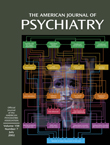Estrogen Therapy and Noncognitive Psychiatric Signs and Symptoms in Elderly Patients With Dementia
Abstract
OBJECTIVE: This study investigated the efficacy and safety of short-term estrogen therapy in decreasing noncognitive signs and symptoms of dementia in demented elderly patients. METHOD: Sixteen moderately to severely demented elderly patients with aggressive behavioral disturbances were randomly assigned to receive conjugated equine estrogens or placebo in a 4-week clinical trial. Frequency and severity of noncognitive signs and symptoms of dementia, as assessed with the Dementia Signs and Symptoms Scale, were compared between estrogen and placebo groups. Data were analyzed with intent-to-treat and regression modeling methods. RESULTS: Estrogen therapy was associated with a significantly greater improvement on the Dementia Signs and Symptoms Scale total score than placebo. All five Dementia Signs and Symptoms Scale subscale comparisons favored estrogen therapy. No adverse effects were observed. CONCLUSIONS: These preliminary data suggest that short-term estrogen therapy may safely decrease the frequency and severity of noncognitive signs and symptoms of dementia in elderly patients.



